By Rick VanSickle
Sitting outside of Marynissen Estates Winery on a warm summer’s day with a couple of young bucks shooting the breeze about all things wine in Niagara, gives me an enormous amount of pleasure.
It’s not just about the wine or the location, it’s about the passion and vision of two Brock oenology and viticulture grads who are quickly carving out a bright future for collaborative beverage making and marketing in Niagara.
Winemaker Mitchell McCurdy (very top photo) and marketing specialist Nick Pappas (below) are as articulate and passionate about Niagara wine as they are about their vision for the Collab Wine & Beverage company, a Niagara-based agency representing and showcasing boutique craft wine and beverage producers in the province.
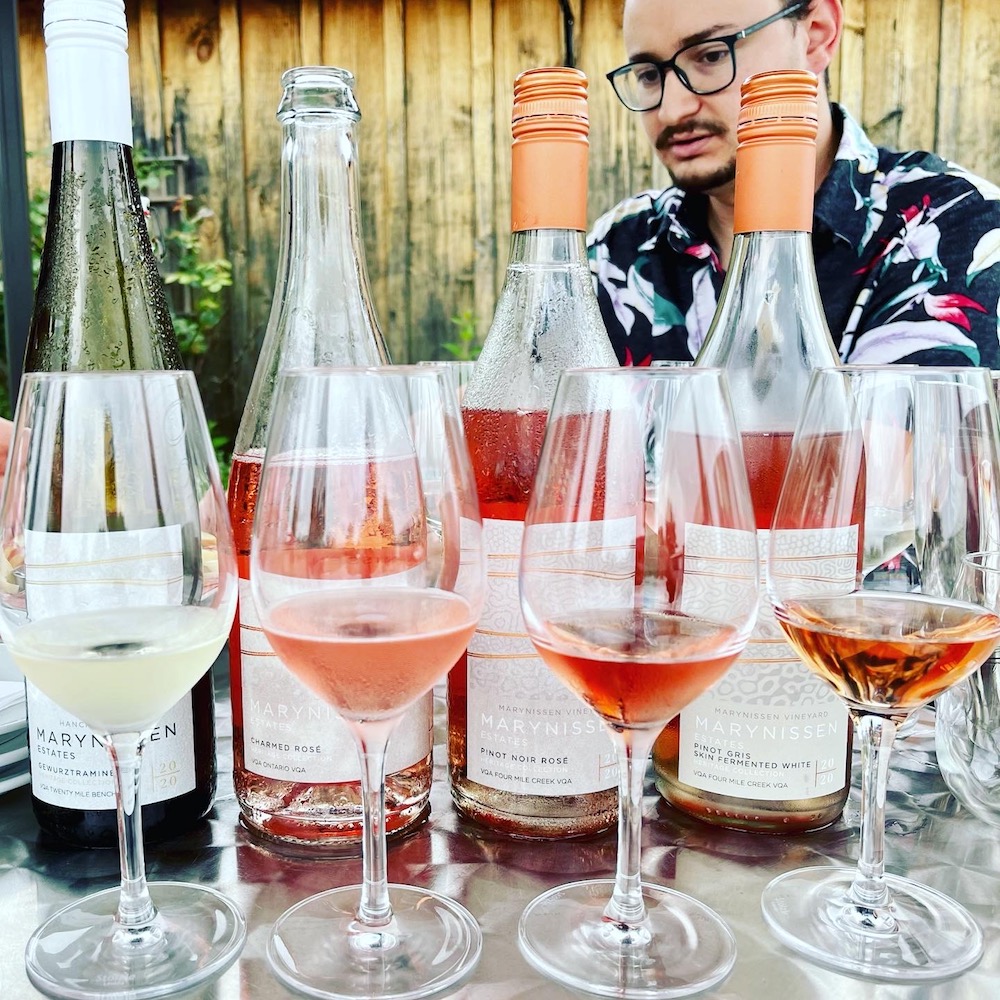
McCurdy and Pappas have joined forces with another winemaker, Marc Pistor, and winemaker and cidermaker Ramsey Khairallah, to create a collaborative effort that is slowly adding portfolios to the company as they continue to formulate plans for a physical presence where homeless (virtual) wine and beverage makers can produce, market and sell their beverages under one roof and one licence.
Already under the Collab umbrella are:
Fogolar Wines, a virtual winery by Marc Pistor, a former assistant winemaker at Inniskillin Winery and head winemaker for Arterra Wines who started Fogolar in 2013.
The Old Tun, a small, virtual beverage company founded by Khairallah out of the desire to create a broad range of interesting, small batch products with unique profiles.
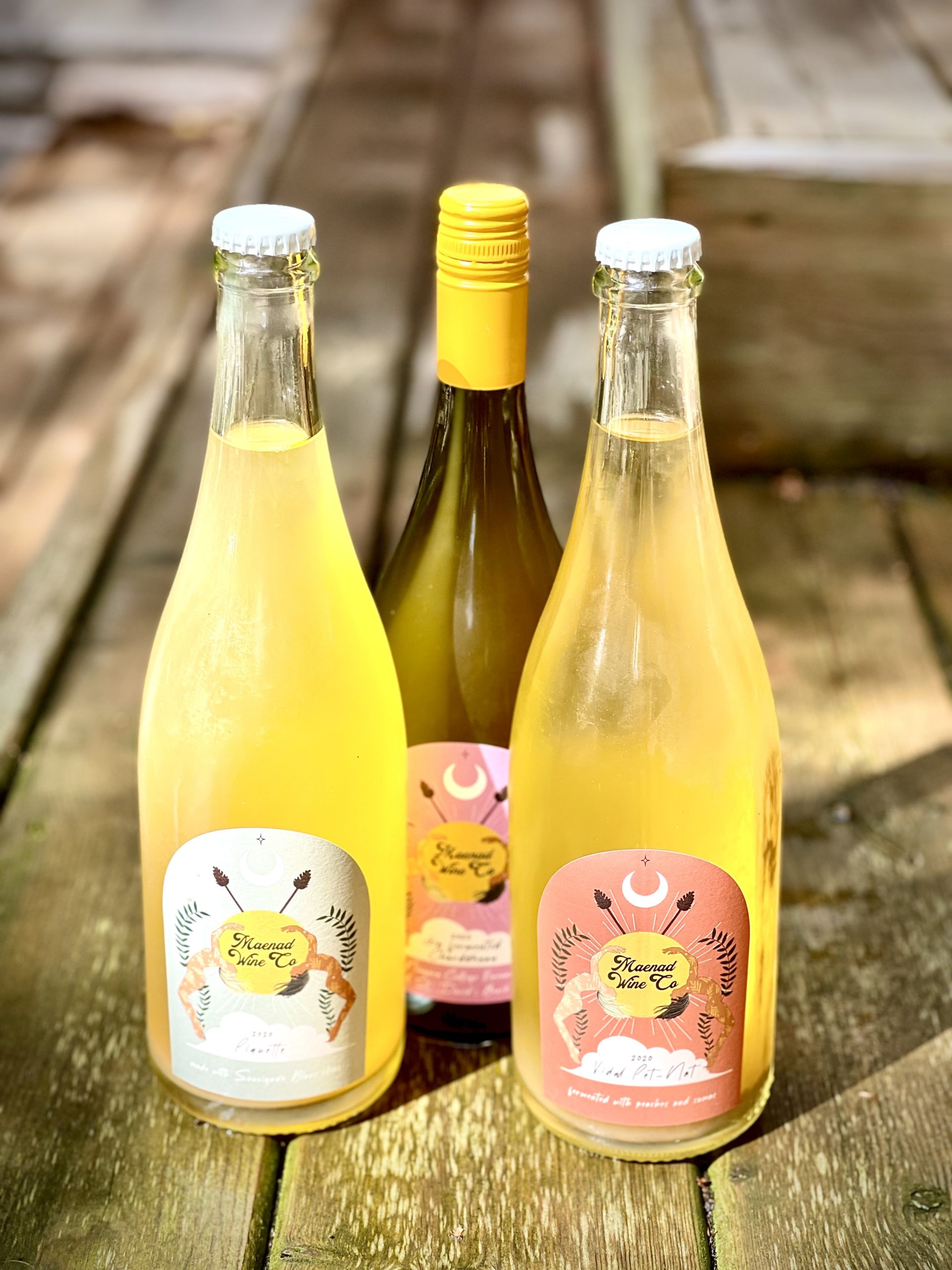
Maenad Wine Co., started by winemaker Yvonne Irvine and her husband Rob Wallace, the project was born out of a desire to create a brand with integrity and produce honest, well-made and interesting wines on their own terms. Wines In Niagara has a post on this unique brand coming soon to the site.
Ev’s Eclectics, a project by McCurdy, which is a collection of different drinks, done in different styles by a curious winemaker.
While all of the above have “day jobs” in the industry, these side gigs allow the wine/beverage makers to sell and market their wines in a collaborative effort with the support of each other. When the next level occurs, a licenced production and retail facility, Collab will be able to provide a wine and cider making shared space for whoever wants to shed the shackles of working off a host winery’s licence.
This is something that has been a long time coming in Niagara. Most major wine regions have this type of co-operative for dreamers who do not have the money to purchase land or build a winery/tasting/retail facility. Many of Niagara’s finest wineries today — think Leaning Post, 2027 Cellars and Big Head — began as virtual wineries, tied to a willing host’s licence with little room to move independently.
It’s a grand idea that will serve the region well.
We review new Fogolar wines and Eve’s Eclectics beverages further down in this post. But first, the wines from Marynissen.
Marynissen Estates Winery
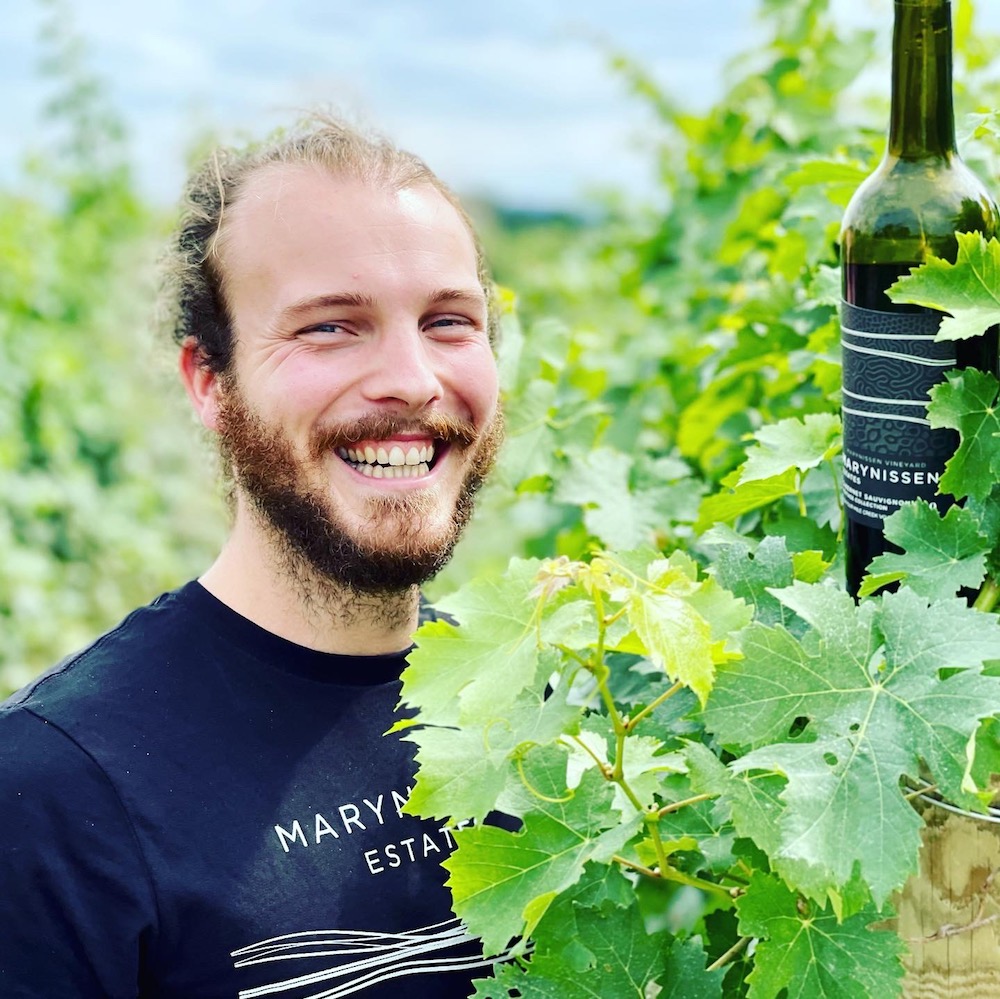
Marynissen Estates is located in the Four Mile Creek sub-appellation and is home to the oldest commercial planting of Cabernet Sauvignon in Canada. The property, which used to be an old pig barn, was purchased in 1953 by viticulture pioneer John Marynissen and his wife Adrianna. The couple began growing their own grapes in 1976, planting the classic noble grape varietals Chardonnay, Gewurztraminer, Riesling, Merlot and Gamay Noir.
Marynissen was sold the winery and vineyard to the Zhang family in 2012.
McCurdy, above, is the winemaker at Marynissen while Pappas is the marketing director. We gathered to taste the winery’s new wines across various tiers along with a few Collab wines. Of interest to me was the enthusiasm of both Pappas and McCurdy, two young men navigating through changing times in the wine industry.
Both have the daunting task of reinventing one of Niagara’s pioneering wineries with a nod to the past while forging a new path.
Pappas studied winemaking at Brock but made the move into marketing and social media out of necessity. McCurdy graduated from Brock University’s oenology and viticulture program in 2018 and has been working under the tutelage of Pistor for the last few years before becoming the winemaker at Marynissen.
Heritage Collection
The Heritage Collection pays homage to Marrynissen founder John Marynissen and is focused on the red and white grapes originally grown at the estate.
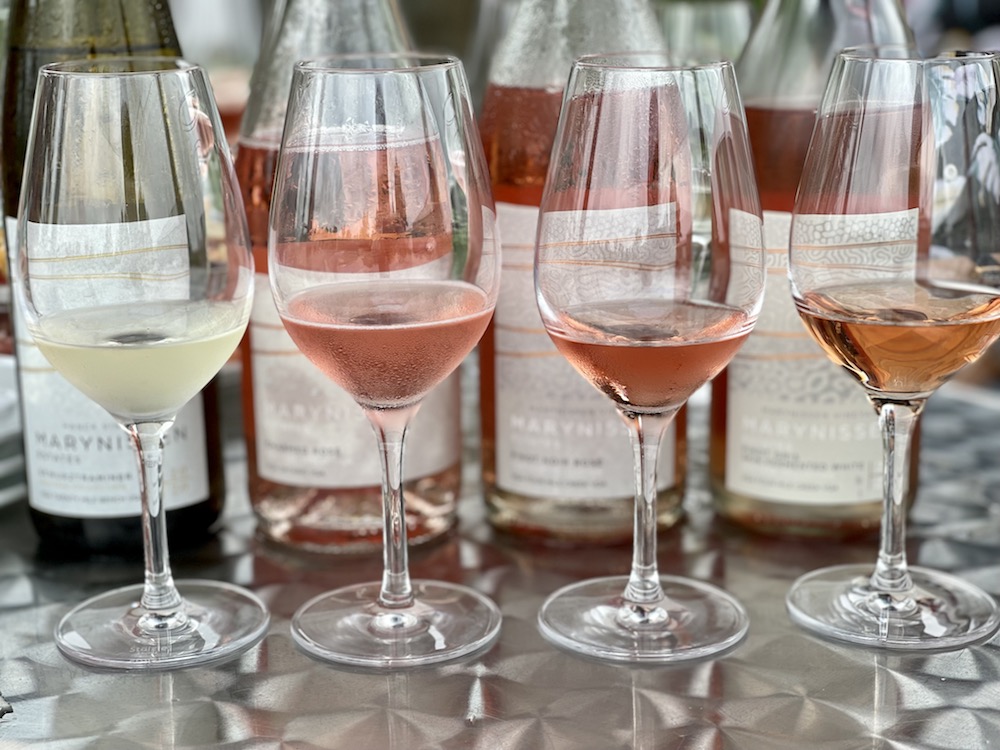
Marynissen Heritage Collection Charmed Rosé 2020 ($25, 88 points) — This saignee style rosé is a blend of Pinot Noir and Merlot. The nose reveals ripe strawberries, cotton candy, raspberries and citrus zest. It has soft effervescence on the palate with notes of strawberry tart, wild raspberries, watermelon and some sweetness on the finish.
Marynissen Heritage Collection Pinot Noir Rosé 2020 ($25, 89 points) — This is a pretty rosé with a fragrant nose of everything red berries and subtle herbs. It’s perfectly dry on the palate with ripe cherries, strawberries and raspberries to go with a zippy finish. Nice job on this refreshing rosé.
Marynissen Heritage Collection Pinot Gris 2020 ($25, 88 points) — This estate Gris was fermented on the skins for 10 days with select yeast strains to enhance palate texture and extract colour before being gently pressed. It shows a lovely copper colour in the glass with notes of mature peach, apricot, tangerine and a clean profile. It’s an approachable “orange” wine and will appeal to consumers new to this style of wine. It shows light tannins in the mouth to go with ripe apricots, peach, nectarine and subtle earthy notes on the lifted finish.
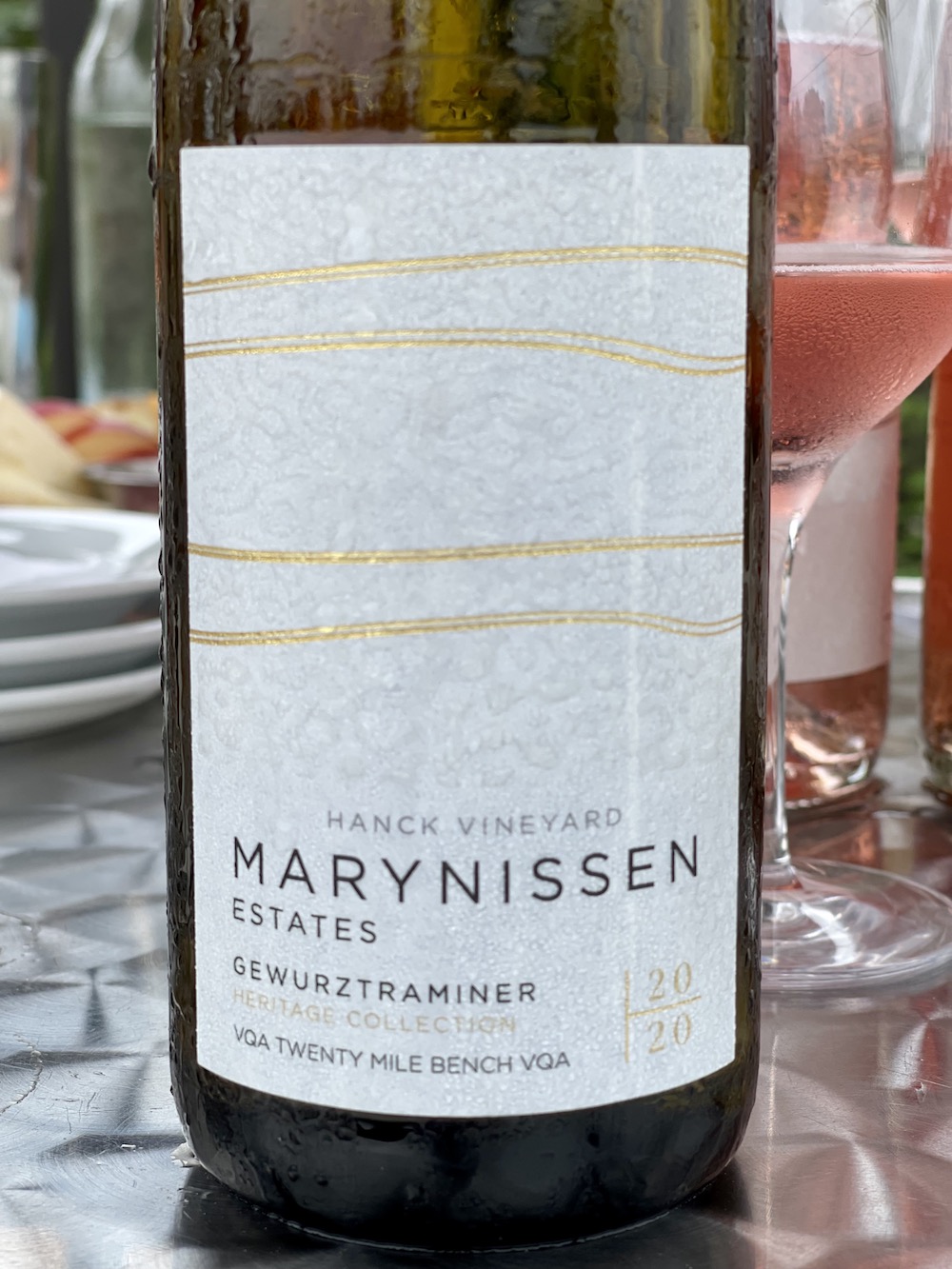
Marynissen Heritage Collection Hanck Vineyard Gewurztraminer 2020 ($23, 89 points) — Gewurztraminer was always something that Marynissen featured and grew at the estate, but the crop was wiped out in the back-to-back Polar Vortex years and now the fruit is sourced from the Twenty Mile Bench. This is highly aromatic, a nod to the warm vintage, with lychee nut, grapefruit, Asian pear, a musky/floral note and an all round ginger bomb. It’s expressive on the palate with lovely texture and then ginger, spicy pear and grapefruit that’s ripe but made in a dry style with under 4 g/l of RS.
Marynissen Heritage Collection Cabernet Franc Gewurztraminer 2019 ($28, 89 points) — The blend is 84% Cabernet Franc and, wait for it, 16% Gewurztraminer. So, perhaps a nod to the Rhone’s Côte Rôtie, where blending red and white grapes is par for the course, but with a Niagara twist? Half the fruit was wild fermented and kept on skins for 24 days before being pressed. It was aged in used French and American oak before being blended. It is different, to be sure, but give it a light chill, and some lovely aromas of lychee, pear, spice, wild raspberries, anise and subtle spicy/floral/herbaceous notes. It’s expressive on the palate with ripe red berries, anise, herbs, that lychee/grapefruit Gew influence and spice with plenty of juicy acidity to keep it balanced on the finish.
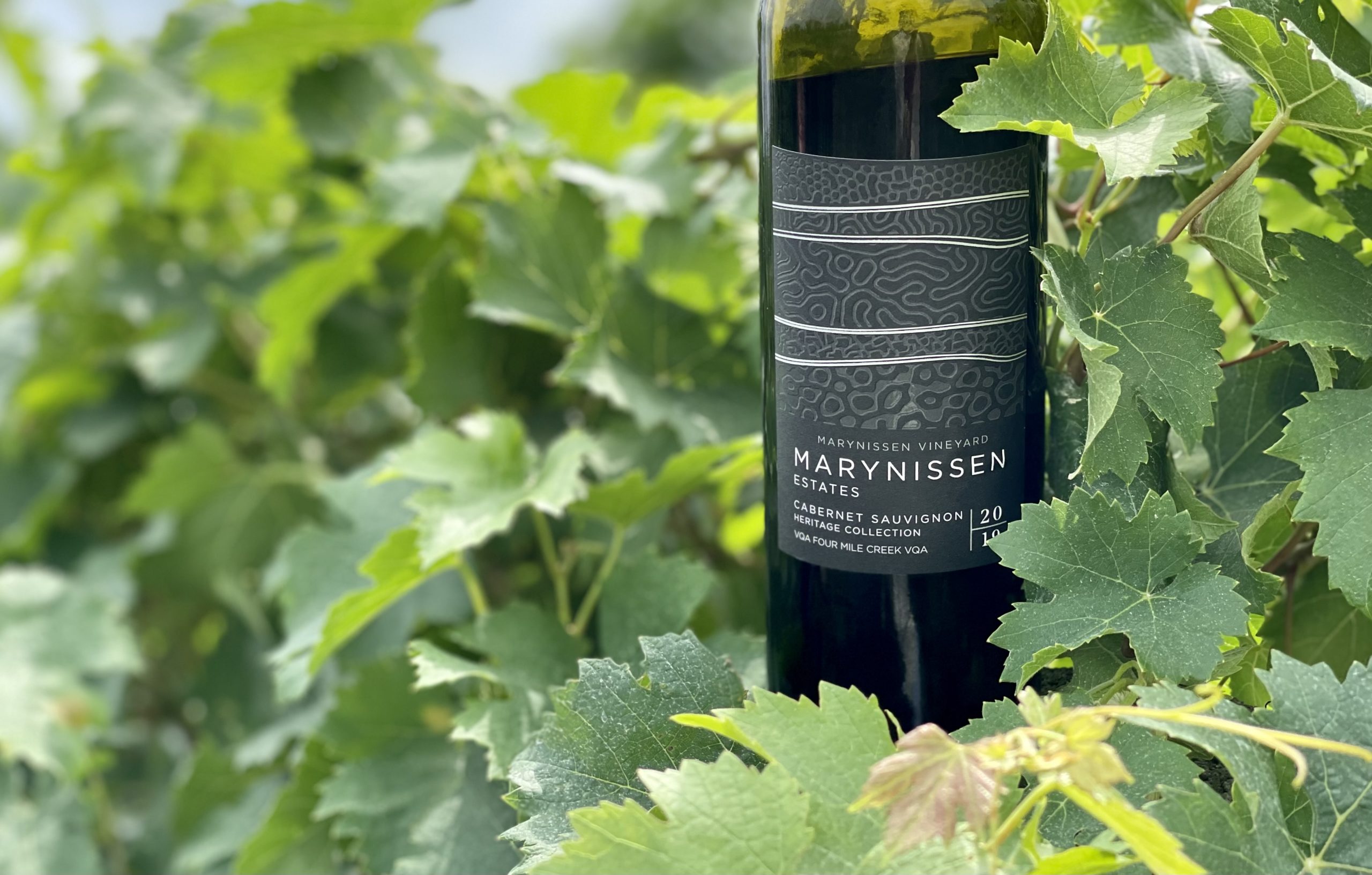
Marynissen Heritage Collection Cabernet Sauvignon 2019 ($30, 91 points) — This Cabernet Sauvignon is from the famed Marynissen Vineyard with its 41-year-old vines, some of the first Cab Sauv vines planted in Canada. However, only an acre remains of the original vines after the brutally cold winters of 2014-15 caused widespread damage to the vines. The vineyard has been replanted using the original trunks, but it will be years before we see the full potential of the wines. As it stands, the surviving vines only yield a tonne an acre of fruit and not enough to do anything with. It gets blended with the replanted fruit and goes into the Heritage Collection. There is some real personality here, but ultimately lacks concentration at this stage. It shows a lighter red colour in the glass with a nose of pretty red berries, bramble, some cassis and currants with integrated spice notes. It’s a lighter style on the palate but possesses persistent and pure red berries, eucalypt, underlying spice, smooth tannins and a vibrant, clean finish. This has all the hallmarks of becoming a fascinating Cabernet Sauvignon in the years to come. I can’t help to think that a really small amount of the original acre of fruit from this vineyard would be a fascinating experiment. This is ready to drink now.
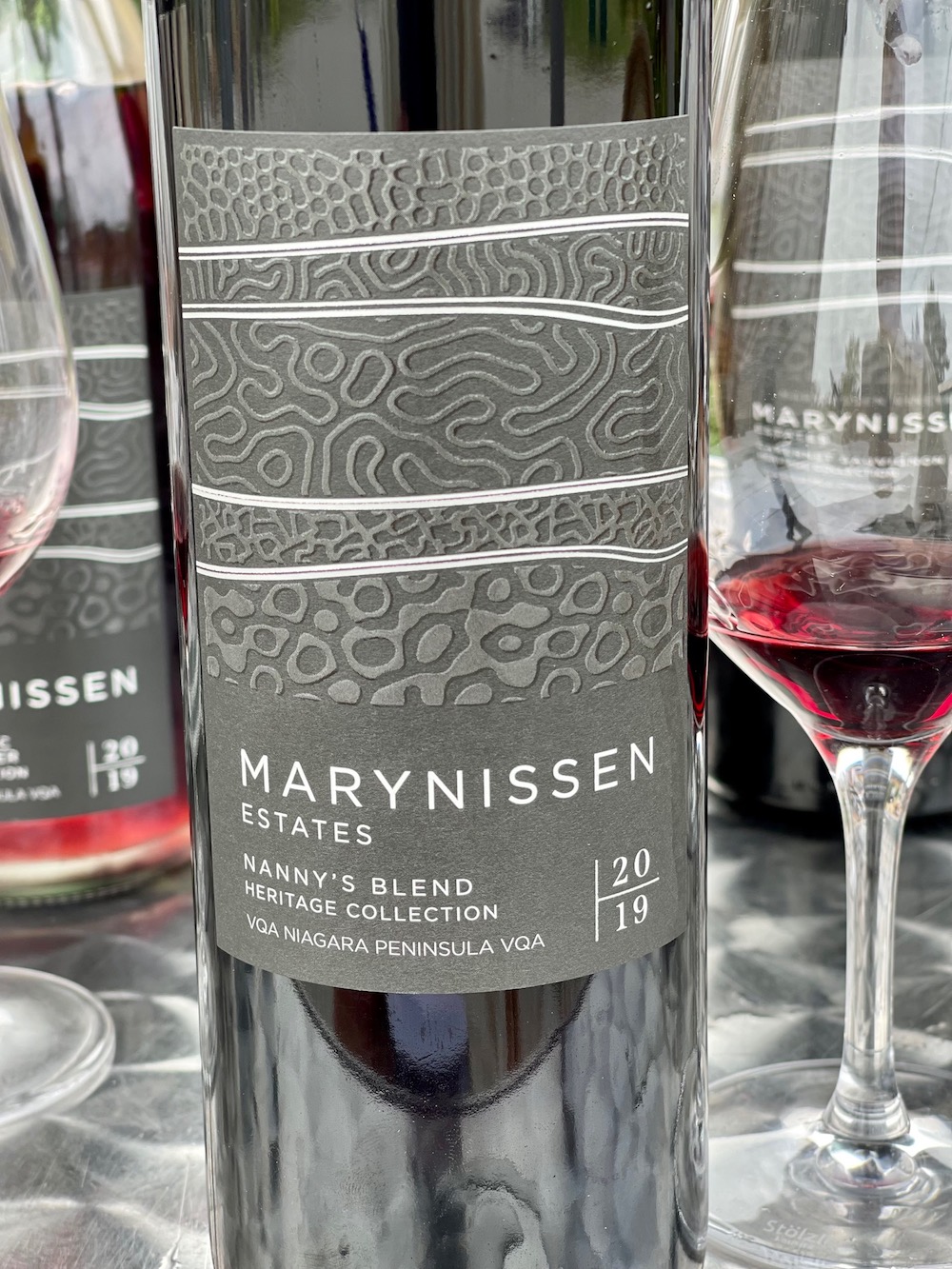
Marynissen Heritage Collection Nanny’s Blend 2019 ($28, 90 points) — The blend, which comes from declassified Platinum fruit, is 53% Cabernet Sauvignon, 44% Merlot and 3% Cabernet Franc with aging in used French, American, and Hungarian oak for 14 months before being bottled. The nose shows savoury red berries, cassis, blueberries, herbs, charred cedar and spice. It has a firm structure with ripe tannins, dense red berries, anise, smoky oak, spice and good acid lift on the finish.
Platinum Series
This is the top tier, the best of what Marynissen makes in any given vintage.
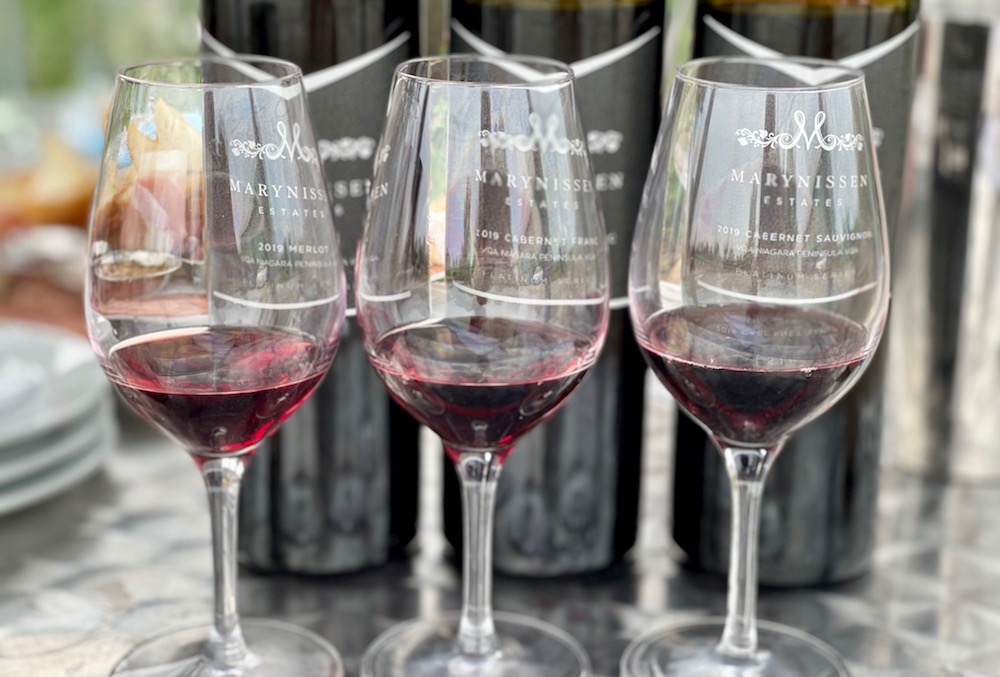
Marynissen Platinum Series Cabernet Franc 2019 ($45, 92 points) — The fruit for this Fedorko Vineyard sourced Cab Franc was aged in used French and American oak for 14 months before being bottled. It has a savoury nose of ripe cherries, brambly raspberries, crunchy cranberries, forest berries, cigar leaf and oak spice notes. It’s a rich and full-bodied wine on the palate with tamed tannins, a mélange of red berries, some anise and cassis, earthy/savoury notes and loaded with oak spices. Can cellar 5+ years.
Marynissen Platinum Series Cabernet Sauvignon 2019 ($45, 92 points) — The fruit was sourced from the Stouck Vineyard and was aged in used French oak for 14 months before being bottled. Right off the top, you need to either decant this for a couple of hours or leave in the cellar for a year or two before opening your first bottle; it’s tight at the moment. But let it breathe and ripe notes of blackberries, dark cherries, black currants, elegant oak spices and charred cedar plank emerge. It’s a big wine, but shy at first blush, that opens up to gobs of dark berries, cherry compote, cocoa, toasted vanilla and spice with dusty tannins and length through a finessed finish.
Marynissen Platinum Series Merlot 2019 ($45, 92 points) — This, too, is sourced from the Stouck Vineyard, an exceptionally warm pocket of the Lincoln Lakeshore sub-appellation, with aging in used French, American, and Hungarian oak for 14 months before being bottled. This is a big red wine that shows ripe cherries, black currants, cassis, elegant spice notes and nutmeg. There is firm tannic backbone on the palate with the full range of red/dark berries, lovely oak spices and plenty of acidity to keep this humming for a few years in the cellar.
Fogolar Wines
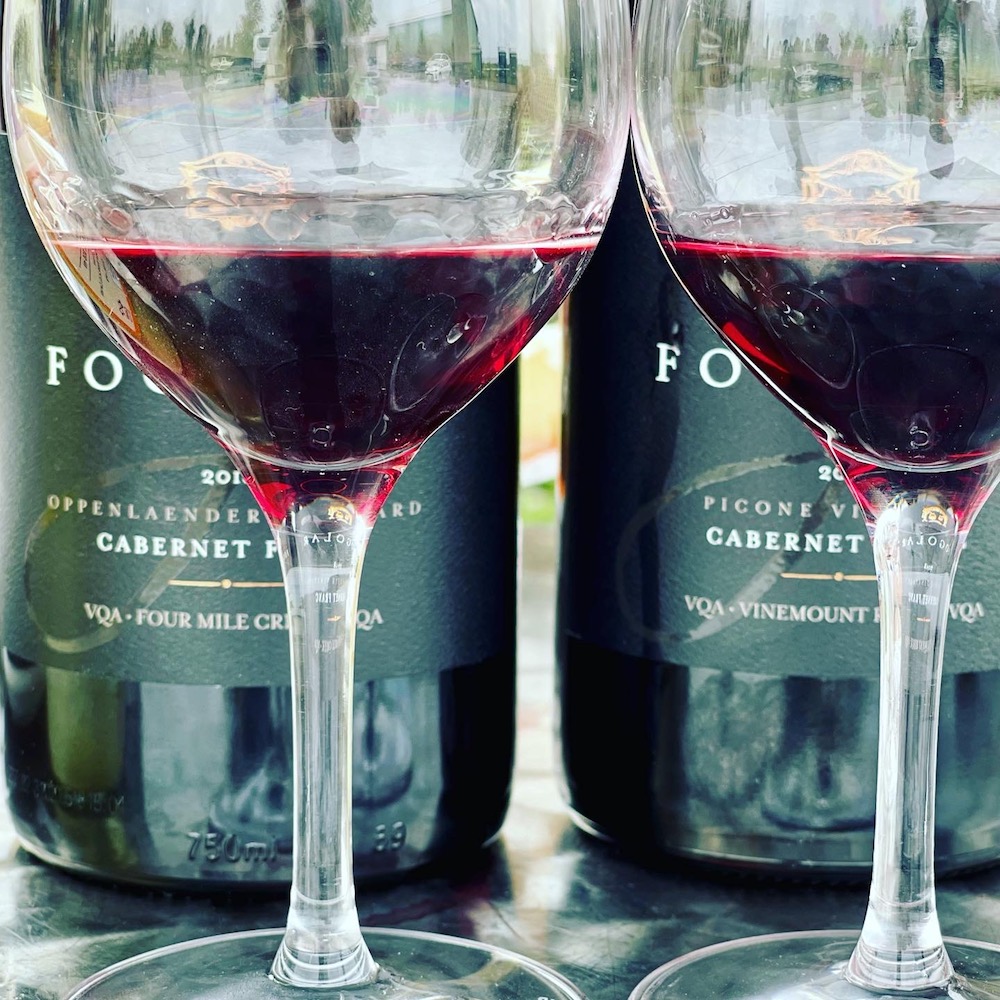
Note: Both Fogolar Wines and Ev’s Eclectics can be purchased through Collab Wine & Beverage here.
The wines of Fogolar endeavour to showcase and celebrate the hard work and skill of Niagara grape growers and the extraordinary potential of wines in Ontario. This brand offers a portfolio of ultra small-batch VQA wines that are true to vineyard, varietal, and vintage.
Owner and winemaker Marc Pistor has had the opportunity to train alongside some of Ontario’s best winemakers, learning his craft and discovering his passion. This journey continues through his own brand while focusing on elevating the reputation of Ontario wines in the eyes of consumers.
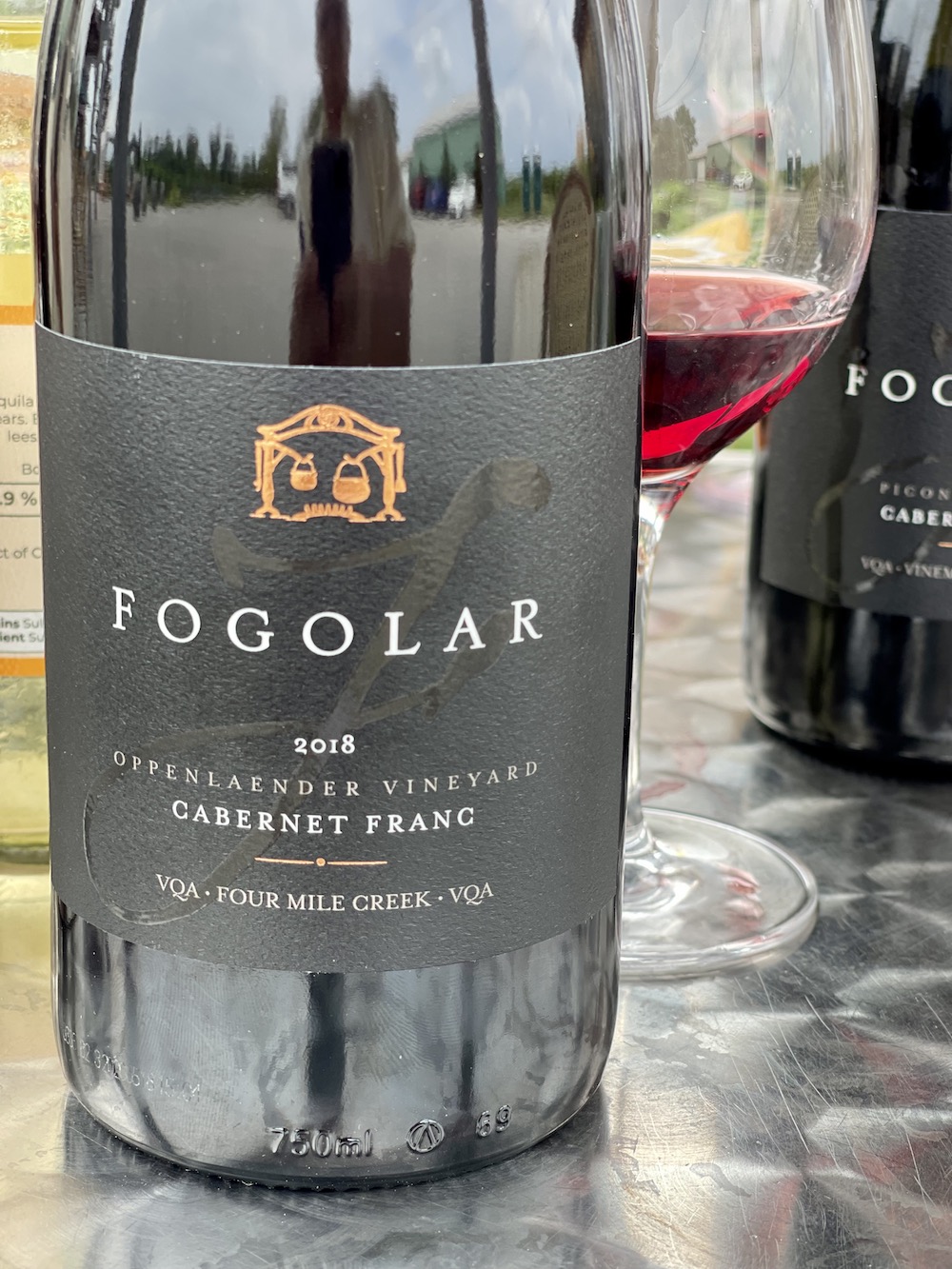
Fogolar Oppenlaender Vineyard Cabernet Franc 2018 ($37, 93 points) — The fruit from the Oppenlaender Vineyard was machine picked and optical sorted before being fermented whole berry for 28 days, then pressed. It was aged in used French oak for 24 months before being filtered and bottled. What a gorgeous expression of CF with a savoury nose of brambly raspberries, ripe dark cherries, herbs, an underlying floral note with some oak spices. There is an elegant feel on the palate from the rounded tannins in support of brambly red berries, cigar leaf, spice and herbs with a lifted and long finish. Can cellar 5+ years.
![]()
Fogolar Picone Vineyard Cabernet Franc 2018 ($40, 92 points) — The fruit was hand picked and destemmed into stainless steel along with the addition of 25% whole cluster fruit. About 20% of the volume was bled off for rosé, and to concentrate the remaining must. It was fermented warm in stainless steel on skins for 28 days before being pressed and aged in used French oak for 24 months before being filtered and bottled. A very different expression of CF from the Picone Vineyard with a more earthy nose and an almost saline impression that gives rise to darker berries, integrated spice notes and some savoury/meaty accents. On the palate, look for concentrated cassis, smoky cherry notes, savoury spices and a firm acidic backbone that keeps it popping on the finish. Cellar 5+ years, maybe more.
Ev’s Eclectics
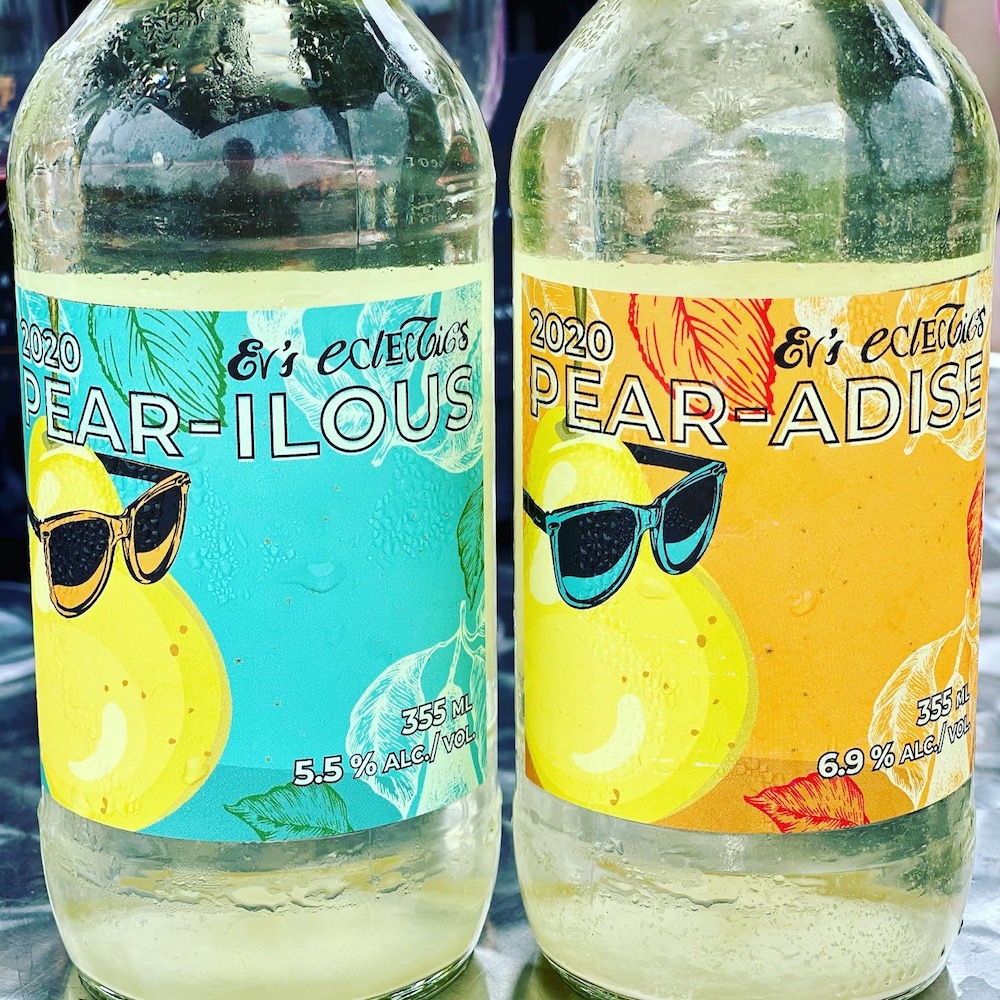
The name is derived from Mitchell McCurdy’s middle name Everett. “My friends call me Ev. I wanted to create a brand that allowed me to make weird and wonderful drinks from all of the beautiful things that Niagara grows.”
Ev’s Eclectics is a collection of different drinks, done in different styles by a curious winemaker.
Ev’s Eclectics Pear-adise ($6.50 for a 355 mL bottle, 93 points) — This delicious bottle-conditioned concoction is made of Niagara Bartlett pear juice fermented and aged in reposado tequila barrels. It’s barrel fermented and barrel aged on its lees. What a treat! Such an earthy nose with pear, subtle tequila notes and a pure saline notes that emerge from the glass. It has soft effervescence and a clean, balanced approach to the pear and tequila highlights and bright finish.
Ev’s Eclectics Pear-ilous ($6.50 for a 355 mL bottle, 92 points) — This parry is a mix of Niagara Bosc pears that are steeped in Dillon’s Distillers Dry Gin 7 botanicals, then bottle conditioned. The floral botanicals jump from the glass on the nose and fold into the pear and pear skin notes. It’s peppy on the palate with those enticing botanicals and pear flavours that all lead to fresh finish. Ready for something completely different? Here it is.


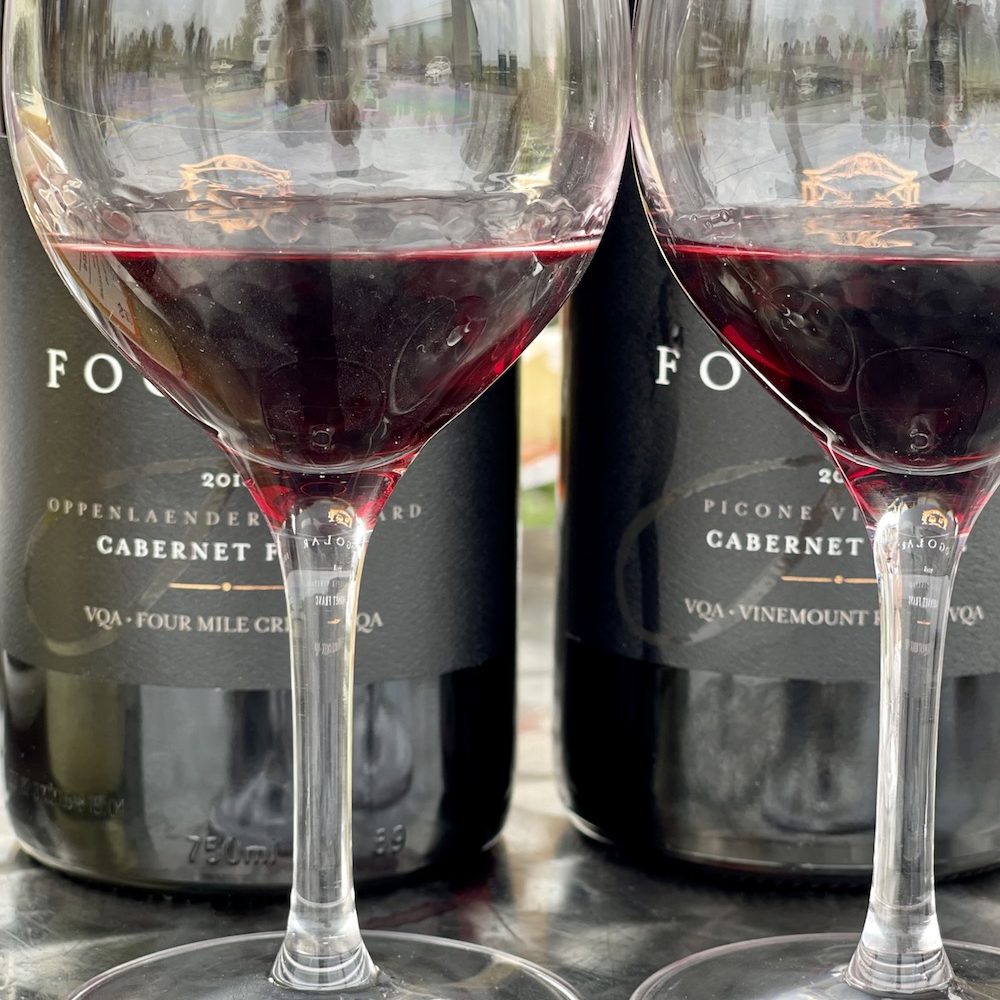




Comment here